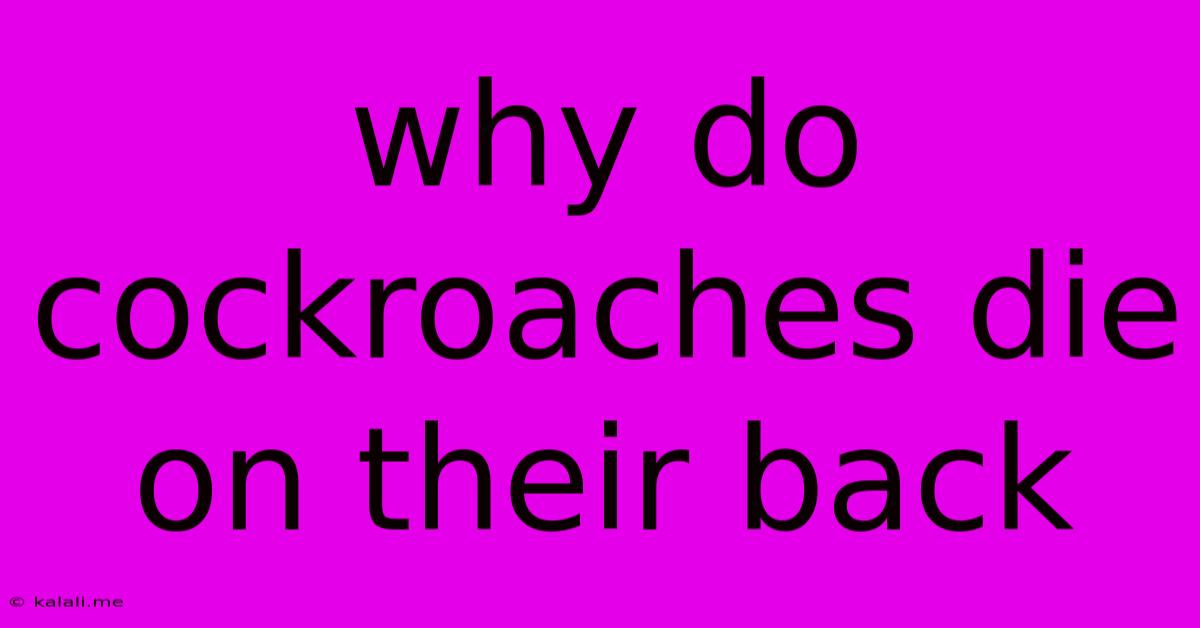Why Do Cockroaches Die On Their Back
Kalali
May 29, 2025 · 3 min read

Table of Contents
Why Do Cockroaches Die on Their Backs? Unraveling the Mystery of the Supine Roach
Have you ever wondered why cockroaches, those resilient insects, often end up on their backs after encountering an insecticide or other lethal threat? It's a common sight that sparks curiosity, and the answer isn't as simple as you might think. This article delves into the various reasons why cockroaches die in this seemingly vulnerable position. It's more than just a random occurrence; it’s a complex interplay of their anatomy, physiology, and the effects of the substances that cause their demise.
Understanding Cockroach Anatomy and Locomotion:
Cockroaches are surprisingly agile creatures, relying on their six legs for rapid movement and evasive maneuvers. Their legs are designed for gripping and pushing off surfaces, utilizing tiny claws and adhesive pads. Their bodies are relatively flat, allowing them to squeeze into tight spaces. However, this flat body shape also plays a significant role in their vulnerability when they're incapacitated.
The Role of Insecticides and Neurotoxins:
Many common insecticides target the nervous system of cockroaches. These neurotoxins disrupt the intricate signals that control muscle function, leading to paralysis and convulsions. This disruption disrupts the coordinated movements necessary for righting themselves. The scrambling movements before death often result in the cockroach ending up on its back, unable to regain its footing.
Dehydration and Exhaustion:
Beyond insecticides, other factors can contribute to a cockroach dying on its back. If a cockroach is severely dehydrated or exhausted, its ability to right itself might be compromised. Its muscles may lack the strength needed for the necessary leg movements. This is especially true for older or injured cockroaches.
The Significance of the Exoskeleton:
A cockroach's exoskeleton, while protective, also plays a role. The relatively smooth and inflexible nature of their exoskeleton doesn't offer much grip when they're on their backs. This contrasts with insects with more textured or segmented bodies, which might have a greater ability to regain their footing.
Why This Position is Fatal:
Lying on their backs presents a significant disadvantage for cockroaches. Their primary means of respiration is through spiracles located along their sides. When on their backs, these spiracles might become blocked, restricting their airflow and leading to suffocation. Furthermore, their inability to move makes them easy prey for predators or vulnerable to environmental hazards.
Beyond Insecticides: Other Contributing Factors
Several other factors can contribute to a cockroach's demise in this position. These include:
- Physical trauma: Injuries sustained from falling or being crushed can impair their ability to right themselves.
- Age and health: Older or weaker cockroaches are less likely to successfully recover from being on their backs.
- Environmental factors: Extreme temperatures or humidity can exacerbate the effects of other factors.
In Conclusion:
The sight of a cockroach dying on its back is not simply a random event. It's the culmination of several factors, including the effects of insecticides, the cockroach's body structure, and its physiological condition. Understanding these contributing elements provides a clearer picture of the vulnerabilities of these often underestimated creatures. The seemingly simple observation reveals the intricate workings of their biology and their interaction with their environment.
Latest Posts
Latest Posts
-
How To Drain Expansion Tank On Boiler
May 31, 2025
-
What Color Eyes Did Hitler Have
May 31, 2025
-
Does God Answer Prayers Of A Sinner
May 31, 2025
-
Divergence Of A Scalar Times A Vector
May 31, 2025
-
How To Wire Batteries In Series
May 31, 2025
Related Post
Thank you for visiting our website which covers about Why Do Cockroaches Die On Their Back . We hope the information provided has been useful to you. Feel free to contact us if you have any questions or need further assistance. See you next time and don't miss to bookmark.